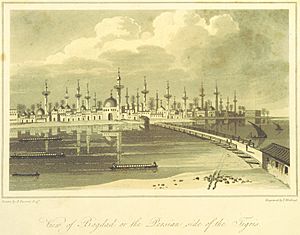Al-Ash'ari facts for kids
Quick facts for kids Abū al-Ḥasan al-Ashʿarī |
|
|---|---|

A depiction of Baghdad from 1808, taken from the print collection in Travels in Asia and Africa, etc. (ed. J. P. Berjew, British Library); al-Ashʿarī spent his entire life in this city in the tenth-century
|
|
| Scholastic theologian; Champion of Islam Imām of the Scholastic Theologians Imām of the Sunnis |
|
| Venerated in | Sunni Islam |
| Major shrine | Tomb of al-Ashʿarī, Baghdad, Iraq |
| Abū al-Ḥasan al-Ashʿarī | |
|---|---|

Abū al-Ḥasan al-Ashʿarī in Arabic calligraphy
|
|
| Religion | Islam |
| Denomination | Sunni |
| School | Shafi |
| Personal | |
| Born | AH 260 (873/874) Basra, Abbasid Caliphate |
| Died | AH 324 (935/936) (aged 64) Baghdad, Abbasid Caliphate |
| Senior posting | |
| Title | Imām al-mutakallimūn, Imām ahl as-sunnah wa l-jamāʿah |
| Religious career | |
| Works | Maqalat al-Islamiyyin wa Ikhtilaf al-Musallin (The Treatises of the Islamic Schools), al-Luma' fi al-Rad 'ala Ahl al-Ziyagh wa al-Bida' (Refutation to Heresy), Al-Ibanah 'an Usul al-Diyanah, Risalah ila Ahl al-Thaghr |
| Influenced | the entire Ash'ari school |
Al-Ashʿarī (الأشعري) was a very important Arab Sunni Muslim scholar. His full name was Abū al-Ḥasan ʿAlī ibn Ismāʿīl ibn Isḥāq al-Ashʿarī. He lived from about 874 to 936 CE. People often called him Imām al-Ashʿarī, which means "Leader Ashʿarī".
He was a theologian, someone who studies religious beliefs using logic and reason. He started a major school of thought in Sunni Islam called Ashʿarism. This school became one of the most important ways of understanding Islamic beliefs.
Contents
Who Was Al-Ashʿarī?
Al-Ashʿarī was born in Basra, a city in what is now Iraq. He later moved to Baghdad, where he spent most of his life. He lived during a time known as the Islamic golden age, when there was a lot of learning and new ideas.
He was known for his deep thinking about God and the world. His ideas helped shape how many Muslims understand their faith today.
His Early Life and Teachers
Al-Ashʿarī first studied with a teacher named al-Jubba'i. This teacher belonged to a group called the Muʿtazilites. The Muʿtazilites believed that human reason was very important in understanding religious ideas. They thought that the Quran (the holy book of Islam) was created by God at a certain time.
However, Al-Ashʿarī later disagreed with some of their ideas. He decided to follow a different path in his thinking.
What Made His Ideas Special?
Al-Ashʿarī became famous for finding a middle ground between two very different ways of thinking about Islam.
Balancing Reason and Tradition
One group, the Muʿtazilites, used a lot of logic and reason to explain everything. They even thought the Quran was created. Al-Ashʿarī argued against this. He said that if the Quran was created, it would mean God didn't always know it, which goes against God being all-knowing.
On the other side were groups like the Zahirites and Muhaddithin. They believed that people should not use philosophy or deep logical debate (called kalam) at all. They thought it was better to stick only to the literal words of the Quran and the sayings of the Prophet Muhammad.
Al-Ashʿarī found a way to use reason and logic, but still respect traditional Islamic teachings. He believed that reason could help understand faith, but it should not go against what is clearly stated in the Quran and Sunnah (the Prophet's way of life).
Key Ideas of Ashʿarism
Al-Ashʿarī's school of thought, Ashʿarism, became very popular in Sunni Islam. It helped explain difficult questions about God's power, human free will, and the nature of the Quran.
- God's Power: Ashʿarism teaches that God is all-powerful and creates everything, including our actions. However, humans still have a choice in how they act.
- The Quran: Ashʿarism teaches that the Quran is the uncreated word of God. This means it has always existed with God, not that it was made at a certain time.
- Understanding God: Ashʿarism says that while we can't fully understand God with our limited human minds, we can believe in His qualities as described in the Quran.
His Legacy
Al-Ashʿarī's teachings became very important for Sunni Islam. Many scholars and thinkers followed his ideas, and the Ashʿari school became widespread. It helped to create a balanced way of understanding Islamic theology that is still studied today.
However, not everyone accepted his views. For example, Shi'a Muslims did not agree with his ideas, as Al-Ashʿarī had written works that disagreed with their beliefs.
See also
 In Spanish: Abu al-Hasan al-Ash'ari para niños
In Spanish: Abu al-Hasan al-Ash'ari para niños
 | Madam C. J. Walker |
 | Janet Emerson Bashen |
 | Annie Turnbo Malone |
 | Maggie L. Walker |

